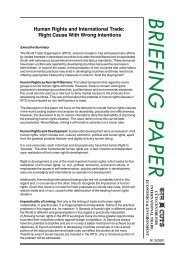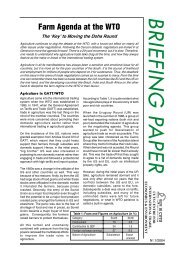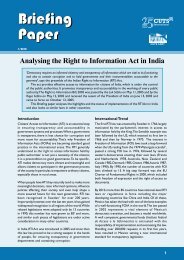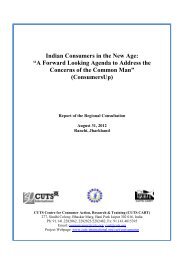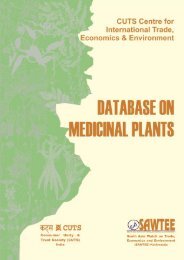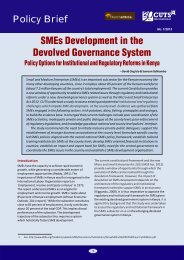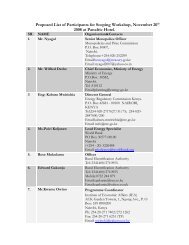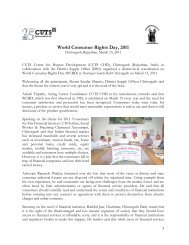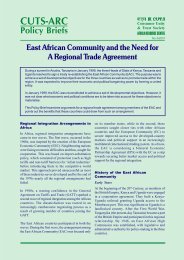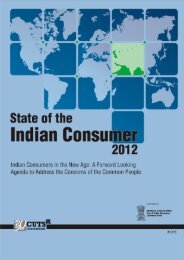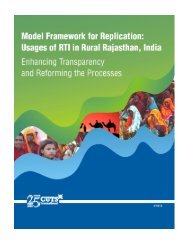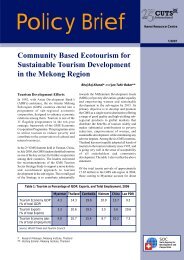Final Report - World Trade Organization
Final Report - World Trade Organization
Final Report - World Trade Organization
You also want an ePaper? Increase the reach of your titles
YUMPU automatically turns print PDFs into web optimized ePapers that Google loves.
Chapter-1<br />
Introduction: The 7-Up Project<br />
In the past, most developing countries were<br />
characterised by large state-owned sectors in highly<br />
concentrated industries and inefficient firms operating<br />
in domestic markets that were insulated by trade<br />
barriers. Since the early 1970s many of these<br />
countries have adopted new policies of trade<br />
liberalisation, de-regulation and privatisation. While<br />
these processes are taking place and developing<br />
countries are remodelling their state-dominated<br />
economies into market economies in much the same<br />
way as the so-called economies in transition are<br />
doing, new challenges arise from these same<br />
processes. Developing countries are seeking<br />
instruments to control and strengthen the functioning<br />
of market forces to cater to their own specific<br />
development needs. More and more developing<br />
countries recognise the importance of implementing<br />
an effective competition policy and law, to achieve<br />
the maximum benefit from the process of<br />
liberalisation.<br />
There are, however, divergent views on both the need<br />
and appropriateness of competition law and policy<br />
for developing countries. Some argue that the<br />
promotion of competition in the domestic market may<br />
not always be conducive to industrial growth and<br />
international competitiveness. 1 Others suggest that<br />
the liberalisation of international trade is sufficient to<br />
promote competition and therefore the formulation<br />
of a competition policy and law is unnecessary. Still<br />
others argue that even if competition law is desirable<br />
in the abstract, the probability of improper<br />
enforcement, misuse of bureaucratic power or<br />
regulatory capture is so high in developing countries<br />
that the expected costs of such legislation outweigh<br />
the possible benefits.<br />
In order to find out and analyse the realities of having<br />
and implementing competition legislation in developing<br />
countries, CUTS, Jaipur, India, has implemented a<br />
two-year research and advocacy project entitled ‘A<br />
Comparative Study of Competition Regimes in<br />
Select Developing Countries of the<br />
Commonwealth’. The project has been undertaken<br />
in seven countries, supported by the UK<br />
Government’s Department for International<br />
Development (DFID) and carried out in association<br />
with local NGOs and research organisations as<br />
partners. 2<br />
1.1 The Project: Objectives and Process<br />
Work on the project, popularly known as the 7-Up<br />
project, started in September 2000. It was formally<br />
launched during a meeting on December 20/21, 2000,<br />
organised in Jaipur, India. The seven countries that<br />
have been selected for the project are: India, Pakistan<br />
and Sri Lanka in South Asia; and Kenya, South<br />
Africa, Tanzania and Zambia in Southern and Eastern<br />
Africa. These countries were selected on the basis<br />
that they had all enacted competition legislation and<br />
had some experience in its implementation.<br />
The main objectives of the project are to:<br />
(i) conduct an evaluation of existing competition<br />
legislation and its implementation;<br />
(ii) identify typical problems and suggest solutions,<br />
inter alia, based on practices prevailing<br />
elsewhere;<br />
(iii) suggest ways forward to strengthen existing<br />
legislation and institutions dealing with<br />
competition issues;<br />
(iv) assess the capacity building needs of the<br />
governments, their institutions and civil society;<br />
(v) develop strategies for building expertise among<br />
the competition agency officials, practitioners<br />
and civil society at large;<br />
(vi) help build constituencies for the promotion of a<br />
competition culture; and<br />
(vii) create advocacy groups at both national and<br />
international levels to pursue the necessary and<br />
required reforms.<br />
1 The argument is that the restriction of competition in the domestic market might be necessary for companies to achieve economies of<br />
scale which will enable them to compete with foreign firms that have already achieved such economies of scale in international trade.<br />
2 See Annexure-2 for details on Project Partnership Arrangement.<br />
Pulling Up Our Socks w 17



